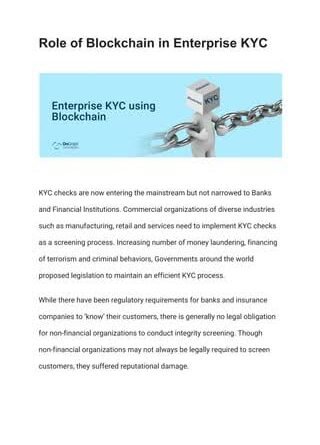The Role of Blockchain in KYC Increasing Security and Efficiency are the Best
Today as we are in the digital age Know Your Customer (KYC) processes are no doubt of high concern for businesses as this is a means for them to adhere to the legislative and stop financial crimes. Through the recent development in the field of blockchain, the KYC in banking industry is undergoing remarkable changes and homes strengthened safety, smooth process, and integrity.
Blockchain, blockchain defines this transparency and also makes this record to impregnable, allow a fundamental feature of no single point of failure in terms of hacking customer education and securing all information, giving act to KYC challenges. Here’s how blockchain is revolutionizing KYC processes:Here’s how blockchain is revolutionizing KYC processes:
1. The practice of KYC which is inherited in general tend to keep personal data of the customers in centralized databases, hence they become easy marks of cyber-attacks and data breach. Based on Blockchain, customer’s data gets encypted and put in multiple nodes, lowering the risk of one single point of failure and illegal access. Furthermore, blockchain uses cryptographic methods of all KYC data to match up and sign the records to make it not possible to modify or damage the records.
2. Through KYC procedures, customers are asked to submit and confirm multiple ID, residence proofs & documents, including bank statements. Blockchain can establish digital identities for individuals or legal entities which however are easily verifiable thanks to the cryptographic mechanisms. Such a reduction of paperwork is made possible by the fact that duplication of document submission is no more required and all the verification procedures for a customer and business become much simpler.
3. The already existing KYC processes has been resource-draining the financial institutions, requiring time, human effort, and high cost or funds to do all the data gathering, verification and maintenance to the customer data. Businesses are able to incorporate automated KYC proceedings with the use of smart contracts which cuts down on the running costs and the occurrence of human errors. Furthermore, blockchain ensures the eradication of intermediaries (including services used to verify the third party) which reduces the overall costs of carrying out KYC.
4. Adherence to regulatory principles is vital in this industry since it may involve serious financial penalties or loss of image. The blockchain ledger provides a reliable and traceable path of KYC process actions that the businesses can use to satisfy regulatory requirements and prove compliance to the authorities. In addition, the immutability nature of blockchain guarantees the invariance of KYC records and prevents them from being altered or tempered with, making it easier for regulatory authorities to conduct verifiable checks.
5. The major challenge for KYC in the traditional way is privacy, as customers don’t get much option to decide how their personal data is being acquired, stored, and shared with other business. Blockchain is beneficial in that customers can keep their digital identity in their possession with a possibility of detaching some parts of the KYC process from the sensitive information without an explicit permission beforehand. The approach of self-sovereign identity makes individuals as their sole keepers of identity data, through a safe and open manner.
6. In the traditional way, KYC can be time-consuming, which leads to challenges for entities that currently act or transact in more than one territory. A blockchain platform inherently came with decentralization features, meaning the need for identification transactions will not be tuned to the location. This widespread availability also facilitates doing international business and offers financial inclusion, which means that those, who would not have options in the formal economy, will have a chance to participate.
Finally, then, blockchain technology comes with a promise that it would replace the KYC processes design by the use of additional features like security, efficiency, and transparency. As more organizations are now embracing the use of blockchain solutions, the future of Know Your Customer (KYC) look bright with the deployment of the technology, enabling businesses to advance their KYC processes, and beneficiaries to the to the savings of cost and enhancement of the compliance standards.




